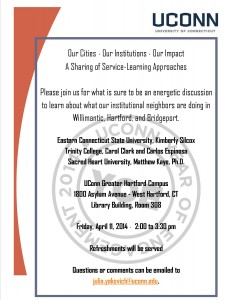
Christine Cress, PhD, professor in the Educational Leadership and Policy Department at Portland State University, will visit UConn Storrs on Wednesday, September 17. This event will focus on the institutionalization of service learning resonating with UConn’s newly adopted Academic Vision. Dr. Cress will discuss how UConn and other institutions of higher education can meet stated academic goals through the pedagogy of service learning.
“Dr. Cress is a nationally renowned scholar for community-based learning across academic disciplines. She has co-authored and published the best selling textbook, Learning through Serving: A Student Guidebook for Service-Learning Across the Disciplines (2nd edition, 2013). Her most recent book, Democratic Dilemmas of Teaching Service-Learning: Curricular Strategies for Success (2011), focuses on teachable moments and pedagogical strategies in the midst of democratic value and belief conflicts.”
Please join us on Wednesday, September 17th. This is an open event to other CT Campus Compact colleges and universities.
Please register below.
‘Vision’ to Reality: Institutionalizing Service Learning
9:30 to 11:00 – Institutionalizing Service Learning from Epistemological and Ontological Perspectives: Past, Present & Future
This presentation will include a small panel response in addition to a Question & Answer session.
Location: UConn Storrs Campus, Konover Auditorium, Thomas J. Dodd Research Center
Please note that the presentation will be streamed live for UConn. Please click here to access it.

